This article dives into techniques designed to enhance functional play in ABA therapy, highlighting personalized strategies that truly cater to each child's unique needs. It shares various methods, like Natural Environment Teaching and visual supports, that not only foster engagement but also promote skill development. When caregivers are actively involved, these approaches can lead to better therapeutic outcomes. Let’s explore this together and see how these strategies can make a difference in your child's journey!
Enhancing functional play within ABA therapy isn’t just a goal; it’s a wonderful pathway to unlocking a child's potential for social interaction and communication. By using targeted techniques, caregivers and therapists can create engaging, personalized experiences that nurture essential play skills.
But how can families effectively navigate the complexities of these strategies to ensure their children thrive in both therapeutic and everyday settings? Let’s explore this together! This article delves into ten impactful techniques designed to elevate functional play in ABA therapy, providing valuable insights for parents and practitioners alike. We’re here to help you every step of the way!
At Rori Care, we take a data-focused approach to ABA therapy, which means we really emphasize individualized strategies that can significantly enhance functional play aba. Our qualified behavior analysts conduct thorough evaluations to pinpoint each child's unique strengths and challenges. This includes looking at potential barriers like family dynamics and logistical issues, which are key to overcoming obstacles in ABA therapy. By doing this, we can create tailored approaches that enhance participation and development, ensuring that each behavioral plan is personalized to meet the specific needs and goals of the child.
For example, our therapists might design specific activity scenarios that resonate with a child’s interests. They use visual aids and break tasks down into manageable steps, making therapy both engaging and effective. Our evidence-driven methods inspire children to explore their surroundings, fostering the development of essential recreational skills in a supportive environment. Plus, we set clear, measurable goals for behavior change and skill development, so progress is transparent and easy to track.
We also highlight the significance of early intervention, as research shows that starting therapy at a young age leads to better outcomes. By consistently monitoring progress and adjusting intervention plans as needed, we reinforce the value of personalized strategies in enhancing functional play aba. This tailored approach not only strengthens the bond between the child and therapist but also empowers families to support their loved one's growth effectively. We want to ensure that parents feel equipped with the knowledge and tools necessary to contribute to their child’s development.
Let’s explore this together! We’re here to help you every step of the way!
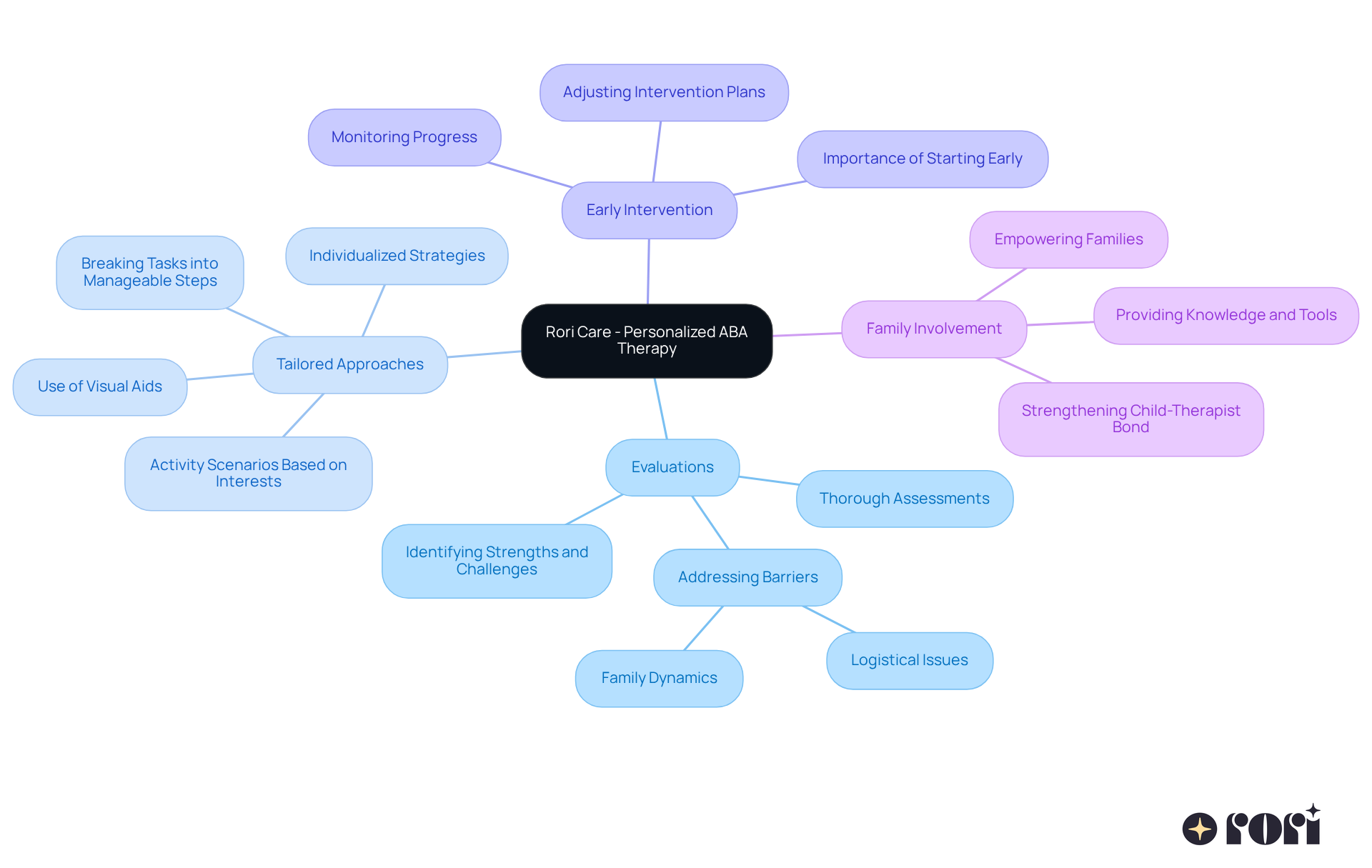
Natural Environment Teaching (NET) is such an important part of ABA therapy, focusing on teaching kids right in their daily surroundings. This approach helps children develop play skills through spontaneous interactions, like playing with siblings or joining in on family activities. For instance, a therapist might help a child use a toy during a family outing, reinforcing those play skills in a real-life setting.
By weaving learning opportunities into everyday activities, kids can use their skills in meaningful ways, which really boosts how well they remember and apply what they learn. Research shows that children who experience naturalistic teaching methods often make significant strides in their development, especially in social and communication skills. This approach not only enhances functional play ABA abilities but also fosters social interactions, making it a vital tool in ABA therapy.
The impact of daily environments on developing play skills is huge! Kids learn to read social cues and engage in cooperative play, both of which are essential for building friendships and enhancing emotional awareness. By creating opportunities for children to interact with different people and settings, caregivers can really help them apply these skills, ensuring that what they learn in therapy translates smoothly into their everyday lives. Active involvement from caregivers is key here; studies show that when caregivers understand ABA principles and strategies, they can greatly boost their children’s progress. In fact, 90% of kids show remarkable improvement when recommended hours are fully utilized with active caregiver participation.
Functional play ABA, along with other organized play activities like imaginative play and group games, is especially beneficial for skill development. They give kids a chance to practice social behaviors in a fun and engaging way. Let’s explore this together! Your involvement can make all the difference in your child’s journey.
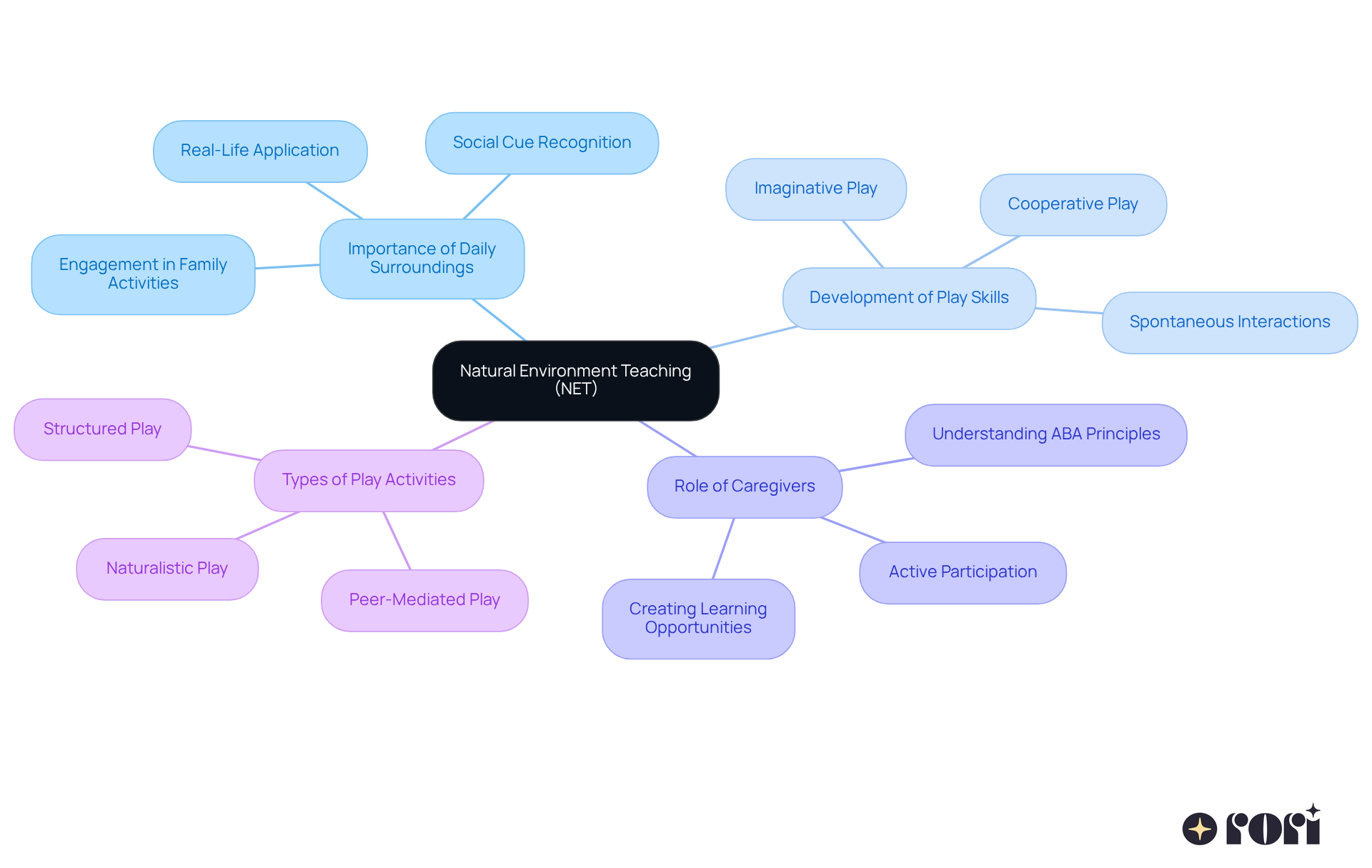
Visual supports are such valuable tools that can really boost young learners' understanding and engagement during fun activities, especially in the world of Applied Behavior Analysis (ABA). These supports come in all shapes and sizes, like picture schedules, visual cues, and social stories that outline the steps in a role scenario. For example, a visual timetable might show the order of tasks during a session, helping kids know what’s next and easing any stress they might feel about transitions.
Research shows that using visual supports can lead to more involvement in activity sessions and fewer temper tantrums during transitions. This makes functional play ABA a key part of effective therapy for children with Autism Spectrum Disorders, ADHD, and other behavioral challenges. By providing clear visual representations, young learners gain a better grasp of what’s expected of them, leading to increased participation and enjoyment in activities.
This approach not only helps with skill development but also nurtures a sense of achievement as kids successfully engage in activities with the help of visual aids. Plus, studies reveal that clients who encounter motivational statements see a 30% boost in positive behavioral outcomes. This highlights how combining visual aids with motivational strategies can be so effective! Visual supports have shown to be beneficial for students with moderate to severe disabilities, regardless of age, showcasing their wide-ranging applicability in various educational settings.
This aligns perfectly with the key benefits of functional play ABA, which include personalized support, adaptable strategies, and empowering caregivers through education. This way, caregivers can better support their children’s developmental journeys. Let’s explore this together and see how these resources can make a difference in your child’s life!

Joint attention strategies are so important for fostering interaction during play! They motivate young ones to focus on the same object or activity with someone else, which is key for effective social communication. For instance, a therapist might use a toy to capture a young person's attention, showing how to share that toy with a friend. This reinforces the concept of joint attention beautifully. These strategies not only boost engagement but also provide caregivers with practical tools to support their child's development.
Engaging in activities that involve turn-taking or cooperative play can really improve joint attention skills. These interactions help kids express their intentions and learn to respond to others, laying a strong foundation for effective interpersonal skills and meaningful relationships. Research shows that kids who engage in joint attention early on are more likely to develop strong language and social skills as they grow.
Some effective strategies for promoting joint attention include:
By weaving these playful strategies into everyday interactions, caregivers can support their children's social and communication growth. This active involvement not only enhances progress but also empowers caregivers with the knowledge and skills they need to make informed decisions that positively influence their child's behavioral goals. As one expert pointed out, "Joint attention is essential for early language growth, enabling young ones to concentrate on the same objects or events as their caregivers." Let’s explore this together!
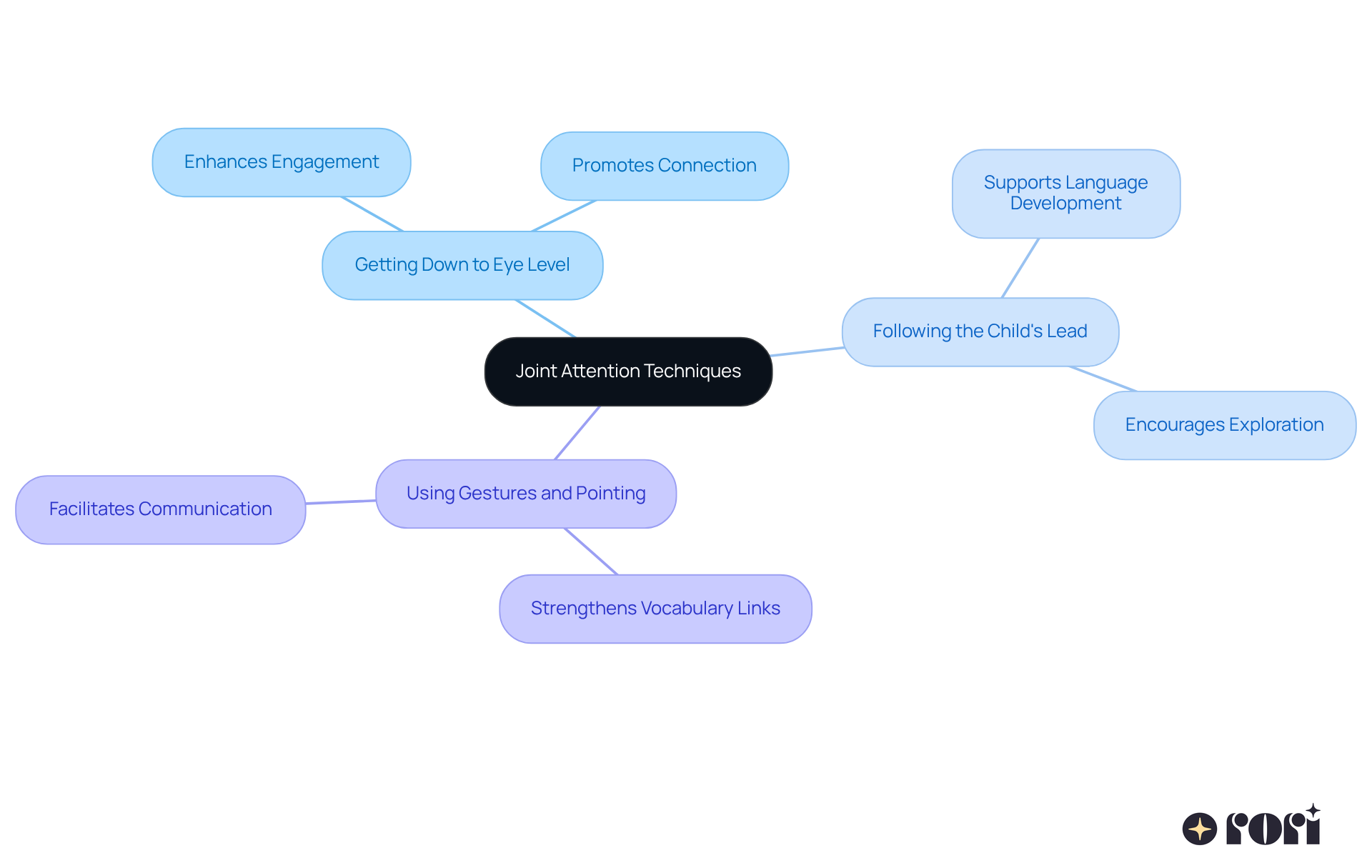
Modeling behavior patterns is a fantastic way to assist kids in functional play ABA therapy! Here, therapists show specific actions for youth to imitate. For example, a therapist might join in on a fun activity like building with blocks while explaining what they're doing. This approach not only provides a clear picture of how to engage but also introduces the little ones to vocabulary related to the activity.
When kids observe and mimic these actions, they can develop important skills like sharing, taking turns, and using toys appropriately. This strategy is especially beneficial for individuals with autism, as it gives them concrete examples of functional play ABA and social interactions. Research indicates that kids with autism often engage in less complex activities compared to their typically developing peers, which makes structured modeling a key part of their learning journey.
There are many success stories with this method! For instance, studies have shown that young individuals often engage in imaginative play after watching peers or adults demonstrate specific action sequences. In one study, kids with autism quickly learned scripted phrases and actions, and they were able to remember these skills over time. These findings really emphasize how valuable emulation is for learning recreational skills, as children thrive when they can observe and replicate actions in a supportive environment.
Therapists often point out that demonstration not only helps kids acquire skills but also encourages interactions among them. By providing clear and relatable examples, therapists can significantly enhance the learning experience, allowing children with autism to thrive in social settings. However, there are still challenges in teaching recreational skills, as kids with autism might struggle to apply what they've learned in different environments. Addressing these hurdles with effective strategies, like video modeling, can further support the development of functional play ABA skills and enhance social interactions. It really highlights the importance of skilled behavior analysts in crafting personalized plans for positive behavior change. Let’s explore this together!

Reinforcement methods are so important for encouraging positive behaviors in our little ones! Positive reinforcement, like giving verbal praise or letting them play with their favorite toys, can really motivate kids to engage in specific play activities. For example, when a child shares a toy with a friend, a therapist might jump in with some enthusiastic praise, reinforcing that wonderful behavior.
And guess what? Using a token system can make this even more effective! Token boards help kids see the connection between their actions and the rewards they receive, making reinforcement feel more tangible. By consistently using these strategies, therapists can nurture positive behaviors that promote functional play aba, leading to increased engagement and skill development during therapy sessions. Plus, when caregivers understand these ABA principles, they can actively support their children's behavioral goals, creating a loving and consistent environment that boosts the effectiveness of the intervention.
Let’s explore this together and make a difference in our kids' lives!
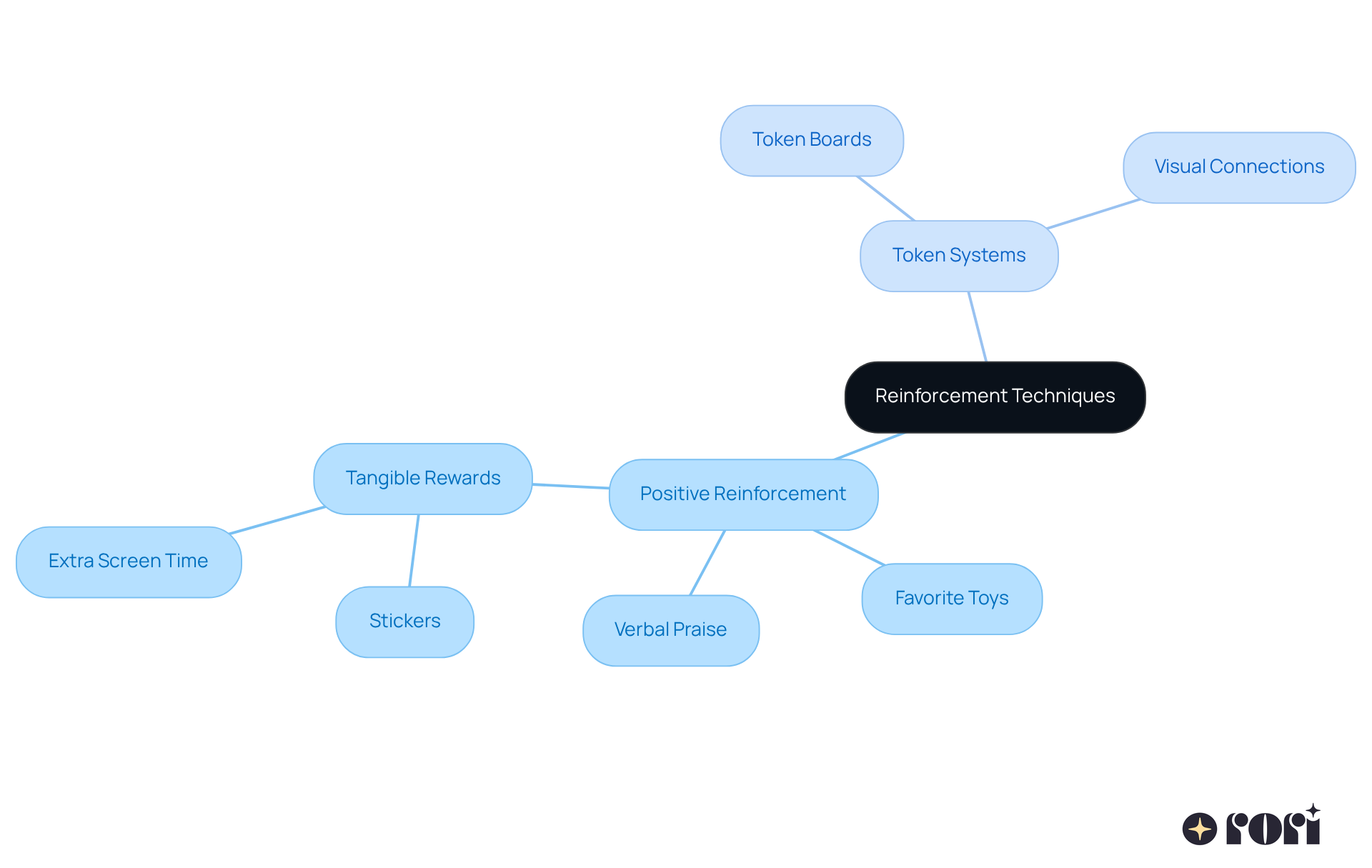
Organized play experiences, such as functional play aba, are thoughtfully crafted to provide a nurturing structure for development in children, particularly those with Autism, ADHD, and other communication challenges. These activities typically hone in on specific goals, such as turn-taking, communication, or problem-solving, all under the guidance of therapists to ensure effective learning through functional play aba. For example, a fun game of 'Simon Says' can be a great way to practice turn-taking, while role-playing scenarios help improve social skills. Imagine kids building a tower with blocks, taking turns to add a block—this not only teaches cooperation but also patience!
By setting clear expectations and goals that align with a child's interests, functional play aba empowers children to focus on developing specific skills while having a blast. This approach not only boosts learning outcomes through functional play aba but also fosters social interactions and teamwork among peers. Research shows that functional play aba significantly enhances engagement and motivation, reduces anxiety by providing a familiar setting for new experiences, and leads to better skill retention and emotional well-being. Plus, the systematic nature of functional play aba creates a safe and consistent environment where children can refine essential skills, supporting their overall growth and independence.
At Rori Care, we truly value the role of caregiver involvement in this journey. By equipping caregivers with ABA principles and strategies, they can actively support their child's behavioral goals through data collection and informed decision-making. As one therapist beautifully put it, 'When young individuals engage in functional play aba and enjoyable, interest-driven activities with clear goals, they are more enthusiastic about learning and retaining new skills.' This collaborative approach not only enhances therapy effectiveness but also fosters a functional play aba that strengthens the bond between caregivers and children, nurturing a supportive atmosphere for growth. Let’s explore this together!

Fostering creative activities is so important for boosting cognitive and social development in our little ones! Techniques like offering open-ended toys, role-playing scenarios, and storytelling can really spark a child’s creativity and imagination. For example, imagine a therapist setting up a cooking station and encouraging kids to dive into imaginative culinary adventures. This kind of play lets them explore different roles and situations in a fun way.
When caregivers learn about functional play ABA principles, they become even more equipped to support their kids at home. This extra knowledge helps them supplement professional interventions and create consistency in functional play ABA activities. Informed caregivers can make choices that positively impact their children’s growth, leading to better behavioral outcomes.
Creative activities not only ignite imagination but also provide opportunities for kids to build interpersonal skills like negotiation and collaboration. By encouraging these types of activities, caregivers can actively participate in their children’s development, which can ease stress and strengthen family bonds. Therapists can play a vital role in this journey, ensuring that caregivers feel empowered to help their children navigate social interactions more effectively.
Let’s explore this together! By embracing creativity, we can foster a nurturing environment for our kids to thrive.
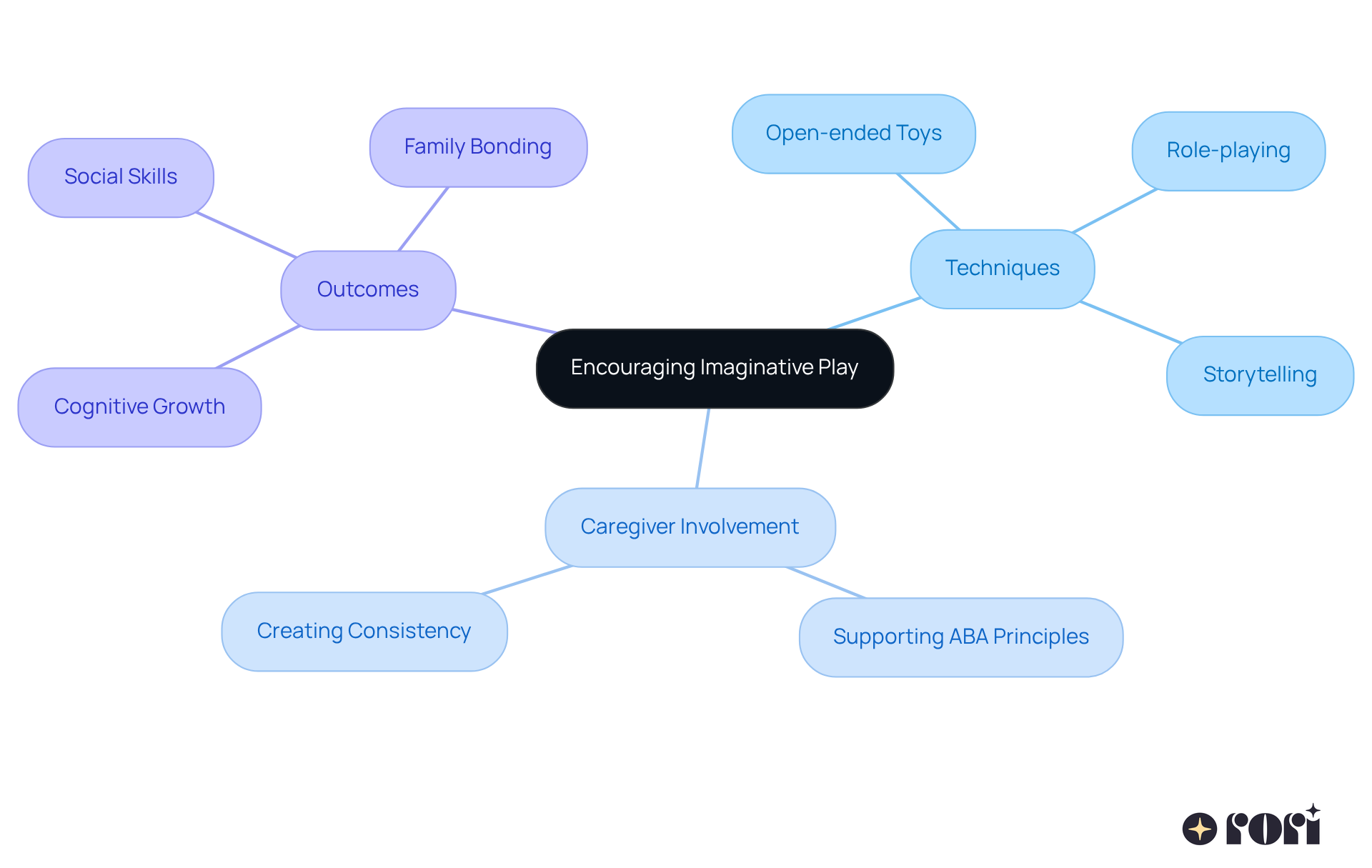
Parental participation is so important for nurturing recreational abilities at home! When parents get involved in functional play aba activities, they can help reinforce the skills learned during therapy sessions. For example, setting aside specific times for turn-taking games or creative projects can really help kids practice and generalize these skills in a comfortable setting.
Research shows that children thrive when their parents engage in their activities. This involvement not only strengthens the bond between parent and child but also enriches the child's learning experience. Creating a supportive recreational environment is key! Parents can tap into resources that provide guidance on effective engagement strategies, like those offered by Rori Care, which include group therapy and individual therapy options.
Quotes from therapists really highlight this point: 'Children benefit most from parents who engage in play with them.' It’s clear that the best toys are parental involvement! By fostering a playful atmosphere that incorporates functional play aba, parents can inspire their little ones to explore, learn, and develop vital social skills, leading to better outcomes in their therapy journey. Plus, through caregiver education at Rori Care, parents gain the insights and skills they need to support their children’s behavioral goals, boosting confidence and easing family stress.
To put these strategies into action, parents can set aside specific leisure time each week to ensure they’re actively participating in their kids' recreational activities. Let’s explore this together!

Understanding how our children are progressing in their recreational skills is so important! Therapists use a variety of methods—like watching how kids play, gathering data, and getting feedback from parents—to track their development over time. For instance, keeping an eye on how well a child can join in cooperative play or follow along with play routines during sessions can give us valuable insights into their social skills and adaptability.
At Rori Care, we’re all about tailoring treatment plans based on the progress report data we collect. This means that every intervention is customized to fit each child’s unique needs. It’s pretty amazing to see that when families fully engage in the recommended hours of therapy, about 90% of kids show significant progress! This really highlights how crucial families are in the therapeutic journey, as their insights into their child’s strengths and challenges are truly invaluable.
Regular check-ins don’t just help us spot areas for improvement; they also guide us in making the necessary adjustments to therapy strategies. By consistently evaluating play skills in a functional play ABA context, therapists can ensure that the interventions are effective and tailored to each child’s specific needs, ultimately nurturing their growth and development. Plus, our automatic data collection methods allow our clinical team to be present during sessions without disrupting the flow for data entry. We make sure that all information is securely stored, anonymized, and deleted after analysis.
In the end, this thoughtful, data-informed approach ensures that every child receives the loving support they need to thrive. Let’s explore this together! We’re here to help you every step of the way!

Enhancing functional play in ABA therapy is a multifaceted approach that truly emphasizes personalized strategies tailored to each child's unique needs. By focusing on individualized interventions, therapists can create engaging environments that foster skill development and social interaction. This method not only supports the child’s growth but also empowers families to actively participate in their child's therapeutic journey.
Throughout this article, we've explored various techniques, including:
Each of these approaches plays a crucial role in improving play skills, ensuring that children can apply what they learn in meaningful ways. The importance of structured play activities and imaginative play cannot be overstated; they provide essential opportunities for cognitive and social growth. Plus, parental involvement is highlighted as a vital component, reinforcing skills learned in therapy and creating a supportive home environment.
In conclusion, enhancing functional play in ABA therapy is significant beyond just skill acquisition; it fosters a supportive community around each child. By embracing these techniques and actively participating in their child’s development, caregivers can profoundly impact their child's progress. Remember, the journey of growth and learning is a collaborative effort, and with the right strategies in place, every child has the potential to thrive. Let’s explore these techniques together and make a meaningful difference in the lives of children and their families!
What is Rori Care's approach to ABA therapy?
Rori Care uses a data-focused approach to ABA therapy, emphasizing individualized strategies tailored to enhance functional play for each child. Qualified behavior analysts conduct thorough evaluations to identify each child's unique strengths and challenges.
How does Rori Care create personalized behavioral plans?
Rori Care creates personalized behavioral plans by evaluating potential barriers such as family dynamics and logistical issues. This allows them to design tailored approaches that enhance participation and development, ensuring the plans meet the specific needs and goals of the child.
What techniques do therapists use to engage children in therapy?
Therapists at Rori Care design specific activity scenarios based on a child's interests, use visual aids, and break tasks into manageable steps to make therapy engaging and effective.
Why is early intervention important in ABA therapy?
Early intervention is significant because research indicates that starting therapy at a young age leads to better outcomes. Rori Care consistently monitors progress and adjusts intervention plans to reinforce the value of personalized strategies.
What is Natural Environment Teaching (NET) in ABA therapy?
Natural Environment Teaching (NET) focuses on teaching children play skills in their daily surroundings through spontaneous interactions, such as playing with siblings or participating in family activities.
How does NET enhance children's social and communication skills?
NET weaves learning opportunities into everyday activities, allowing children to use their skills in meaningful ways, which boosts their ability to remember and apply what they learn. This approach enhances functional play abilities and fosters social interactions.
What role do caregivers play in the effectiveness of ABA therapy?
Active involvement from caregivers is crucial, as studies show that when caregivers understand ABA principles and strategies, they can significantly boost their children’s progress, with 90% of kids showing remarkable improvement when caregivers participate actively.
What are visual supports and how do they benefit children in ABA therapy?
Visual supports include tools like picture schedules, visual cues, and social stories that help young learners understand and engage in activities. They enhance participation, reduce stress during transitions, and lead to fewer temper tantrums.
How do visual supports contribute to positive behavioral outcomes?
Research indicates that combining visual aids with motivational strategies can lead to a 30% increase in positive behavioral outcomes, helping children successfully engage in activities and nurturing a sense of achievement.
Who can benefit from visual supports in ABA therapy?
Visual supports are beneficial for students with moderate to severe disabilities, regardless of age, showcasing their wide-ranging applicability in various educational settings.